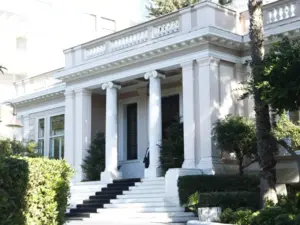«Debut» on parapolitika.gr’s political show titled «Black Box» by Thanassis Fouskidis today features Environment and Energy Minister, Stavros Papastavrou, who referring to the massive energy deals announced both during the 6th P-Tec at Zappeion and during Volodymyr Zelensky’s visit to Athens, speaks of the «unique opportunity» –as he characterized it- created for Greece due to its geographical position, from the European and American decision to completely eliminate Russian natural gas from the Old Continent.
«Our country has a geographical position between three continents, it has infrastructure, Revithoussa, the FSRU, it has companies, which have both executives and experience that play leading roles in the international sector and it also has political and economic stability, which allows a foreign investor to consider that there is security. Therefore, these agreements are primarily a vote of confidence for our country. That our country can be the gateway for American natural gas to enter and traverse along the Vertical Corridor a region of 7 countries and 100 million people» he notes characteristically.
Stavros Papastavrou: “The energy agreements are of national importance”
Mr. Papastavrou emphasizes that among the agreements, the one for hydrocarbons stands out, as he said, «this is an agreement which has very great national importance». At the same time, he highlighted the need to create «the greatest possible national consensus».
As for what exactly the country will gain from hydrocarbon drilling, the Environment and Energy Minister states that «it is clear that whether the deposits are commercially exploitable, nobody knows» if drilling doesn’t start first. However, he emphasizes that «what is happening now is that for the first time in the last 40 years, we will have an exploratory drilling in the next 18 months. So, we will have the moment of truth. We will know if in Block 2, there is a commercially exploitable deposit. If it is commercially exploitable, then this by itself has very significant economic consequences for our country».
And he continues listing the aforementioned consequences: «This primarily means, confirms, that all this discussion we have had for the last decades, that there is marine hydrocarbon wealth in our country, is confirmed. Because you understand that if it exists in Block 2, off Corfu, one can assume that in all the marine plots of Western Greece or Southern Crete, there may be similarly exploitable deposits. So our underwater wealth acquires very great value».
Specifically for Block 2, the final agreement for which was signed at Zappeion last month, Mr. Papastavrou points out the «hypocrisy» –as he characterized it- of the opposition, when Mr. Famellos was exercising harsh criticism, while the original contract was signed under SYRIZA.
Stavros Papastavrou: “Greece will earn 40% of profits from hydrocarbon exploitation”
«The contract therefore, stipulates», according to what Stavros Papastavrou states on Black Box and parapolitika.gr, «that 20% of profits is tax to the Greek State. 5% goes to Regional Communities. There is the Royalty, which is a form of rent, which is from 4% to 15%, which relates to how many barrels come out and is on turnover, not on profits. There are a series of other amounts. We will take all of them. So we’re talking about approximately 40% of profits. That is, from 100 euros that will be earned, 40 will go to Greece. But I repeat, this is from one deposit. This will mean for our country that it is confirmed that there is exploitable marine wealth. And this puts us on another level. I don’t know if we become Norway, but we enter a different field of economic development. There will be public revenues, which the country will be able to utilize. And possible energy sufficiency».
“The English text of the contract with Chevron for Crete was approved by EDEVEEP’s Board of Directors”
At this point, the minister reveals to parapolitika.gr that «the English text of the contract with Chevron for Crete was approved by EDEVEEP’s Board of Directors and we are going to the Court of Audit, so we have an approved contract». After the Court of Audit remains the final stage, Parliament. This, according to Stavros Papastavrou «means that in Corfu, in the Ionian we will have ExxonMobil doing the drilling at the end of ’26 – beginning of ’27, and in Crete, we will start in early ’26, when the contract passes through Parliament, geophysical and seismic surveys».
“Maximum national consensus is needed”
To journalist Thanassis Fouskidis’s question about possible new provocations from Turkey ahead of drilling in Southern Crete, the minister is clear: «I think that the course so far has shown that without drum-beating, with self-confidence, in an institutional way, we kept all the timetables. Because ExxonMobil and the International Oil Community, what interests them is that there is a country that keeps its commitments. The timetables it agrees to are very important. It shows reliability. And for us it is the national wealth of all Greeks. It is not only those who vote New Democracy, PASOK, SYRIZA, or nothing. It is for everyone. And that’s why I say it is a national matter and requires the maximum possible national consensus and support».
As for PASOK’s arguments that it is the party that paved the way for these agreements to come, the minister refers to Yannis Maniatis, saying that «he was among the people who dealt with… I repeat it constantly». And after characterizing «of enormous importance» the Maniatis law under the Samaras – Venizelos government, he emphasized that even under the SYRIZA government this «was among the few things it didn’t dismantle». However, at this moment he attributed to PASOK «inconceivable double-talk», as Yannis Maniatis says one thing, Haris Doukas another and Anna Diamantopoulou something else.
And he repeats the need for the greatest possible national consensus, saying: «The hydrocarbon sector is the natural wealth of Greeks, not Americans. At this moment the largest listed oil companies in the world are American. What should we do now? Not do extractions because they are American? Do you know that in Albania, Turkey, Egypt, Cyprus, Libya, Israel, there are companies doing research? Only we will always stay out? Why? We need to build the greatest possible national consensus. The hydrocarbon sector has a deep national character».
“Every 25-30 years water shortage problems appear in Attica”
Changing subject, Stavros Papastavrou asked about water shortage, points out that from 2022 onwards a decrease in water in reservoirs began to be observed. Analyzing the causes, the minister refers to climate change, which has led to 25% fewer rainfalls, greater evaporation of water and therefore losses of water quantities. This means -according to Mr. Papastavrou- that the strategy must change.
The minister emphasizes that «it is impressive that the phenomenon of water shortage appears in Attica every 25-30 years, when a major project is undertaken». Noting historically that «every generation faces the phenomenon of water shortage in Attica» and that «every 25-30 years Attica needs to undertake a major significant project to strengthen water supply» he emphasized that «at this moment that’s where we are again».
That’s why two very large projects are being planned, according to the minister, who responded to criticism about delays by saying that «these projects are large-scale, solve the problem for 20-30 years, have great cost, require very extensive preparation». To the question of whether in two years we will have water in Athens, Mr. Papastavrou emphasizes that «the government’s obligation is to provide those services it owes to its citizens and that’s why we act daily. And we act in such a way that it’s not only tomorrow in one year in two years, but also the next ten and twenty years».
Stavros Papastavrou: “Samaras defended me at a very difficult moment”
Changing the mood, journalist Thanassis Fouskidis asked the minister about the close cooperation he had in the past with Antonis Samaras, with him answering that «Mr. Samaras defended me not at any moment, he defended me when I was receiving a merciless attack from Mr. Tsipras. So, he honored a colleague of his in a way that I think is exemplary. And I thank him very much for that and I never forget it».
As for Alexis Tsipras, Stavros Papastavrou states: «I haven’t read his book. I think the years he was prime minister, he mentioned me from the Parliament podium many times. So I’m full of references». Nevertheless, from what has leaked the minister reached some conclusions: «First there is the complete debunking of the first time left. […] Greater delegitimization of all the totems of the first time left I have never seen again». «The most debunking thing about Tsipras’s book is that Obama saved the “first time left” and not Russia» he noted.
To the question about what will happen if New Democracy cannot be autonomous in the next elections, Stavros Papastavrou answers that «the geopolitical landscape is shifting sand. At all levels. In geopolitics, economics, technology. There are no constants», which is why he believes that




